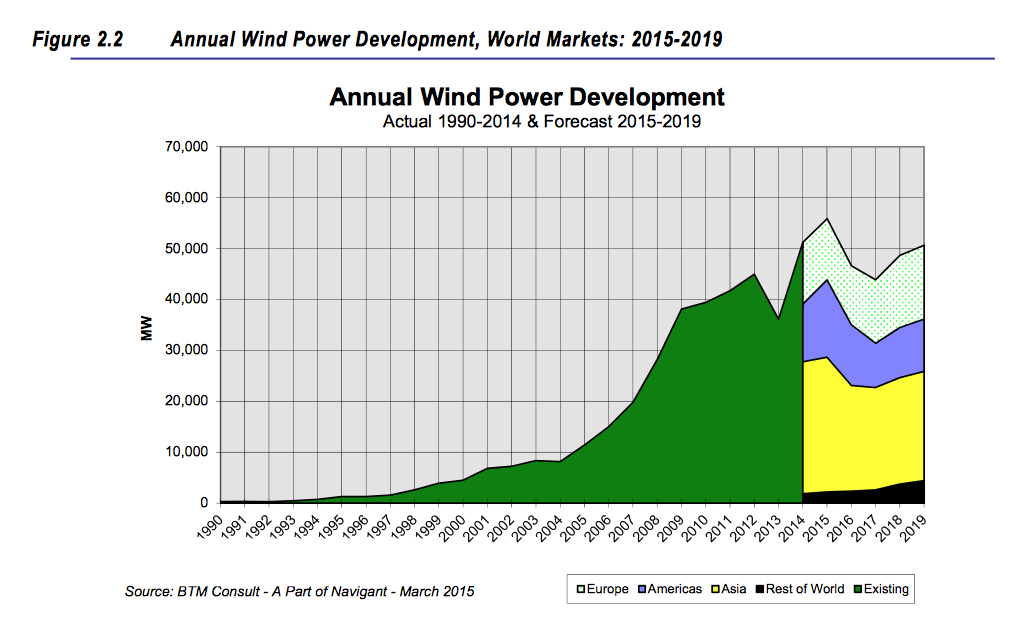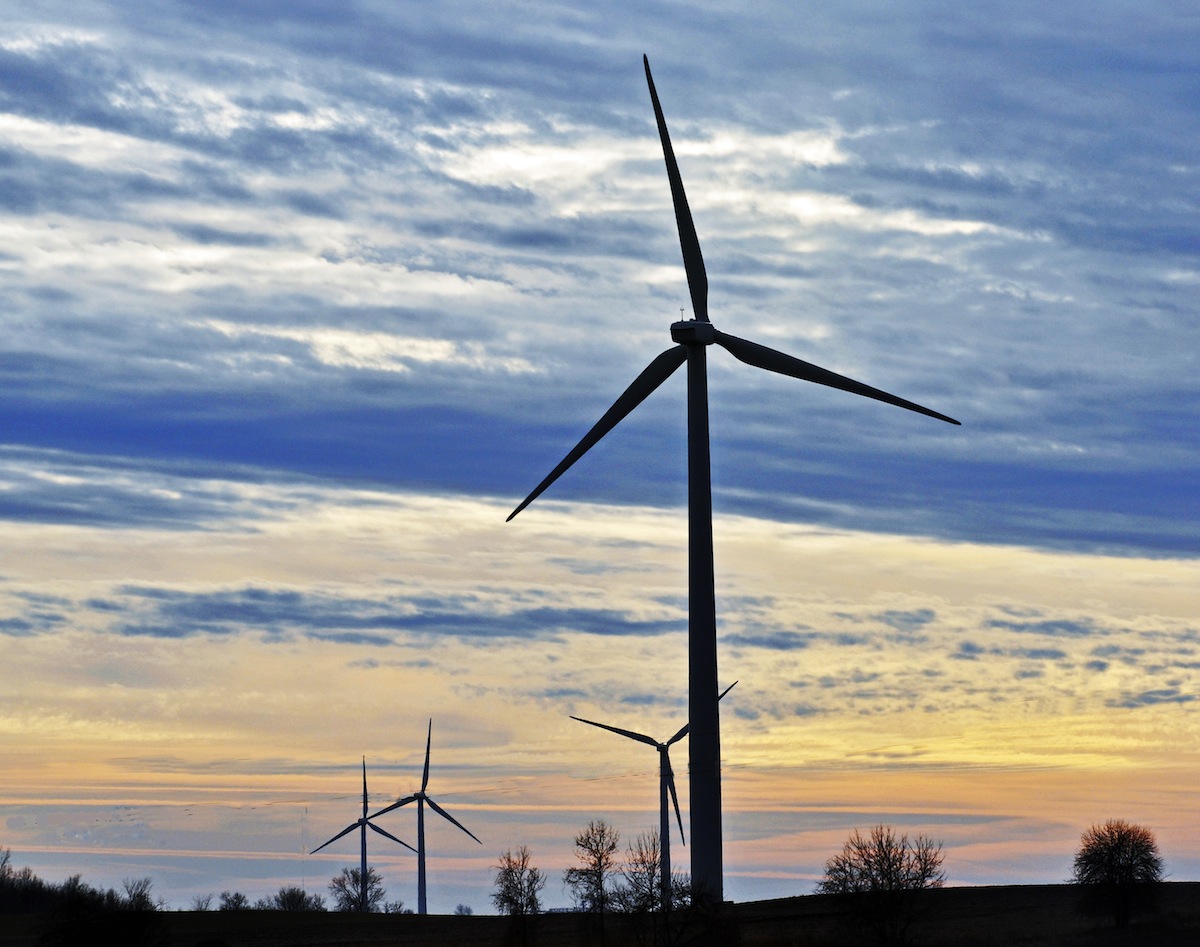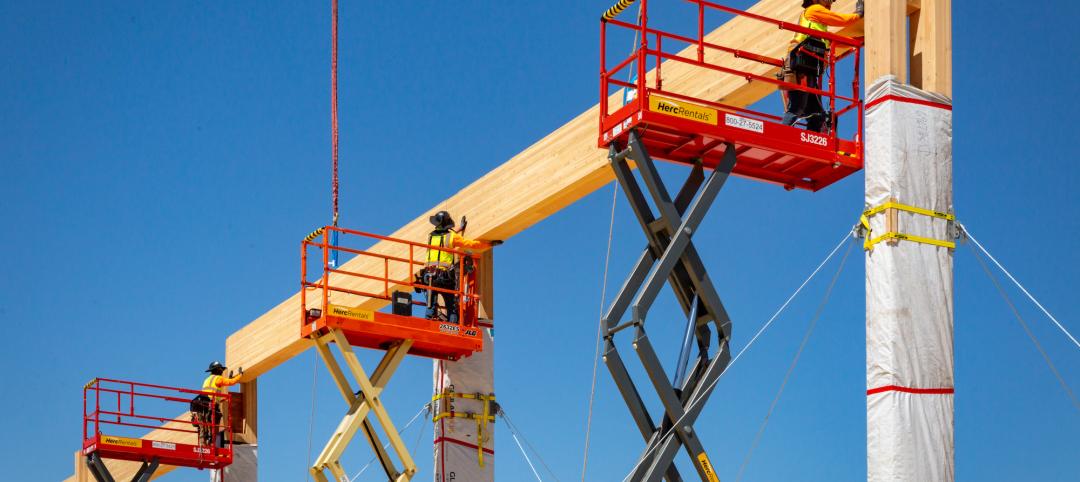After a 20% falloff in 2013, the global wind power industry made a strong comeback in 2014, with a record 51.2 gigawatts (GW) installed, representing a 42% increase over the previous year, according to the BTM Consult arm of Navigant Research in its latest World Wind Energy Market Update 2015.
China alone installed a record 23.2 GW of new wind power last year. All told, the global five-year average growth rate was 7.8%, and cumulative installed capacity rose to 373 GW by the end of last year
However, Navigant projects a curtailment in the growth of annual new installations through 2019. Over that forecast period, installations are expected to increase by only 0.3% per year, and that includes an 8.9% growth in 2015. A total of 245,547 megawatts of wind power will be added over the forecast period, increasing cumulative capacity by 13.2% per year.
China will continue to lead the world in installation activity for the foreseeable future. But Navigant doesn’t expect that country to add more than 17 GWs in any given year.
Navigant foresees a “substantial” drop in installations in Germany due to changes in incentive structures after 5.1 GW of wind power were installed last year, which was higher than anticipated.
 Chart from Navigant Research's wind power outlook
Chart from Navigant Research's wind power outlook
The U.S. wind power market has been recovering, thanks to the 2013 extension of the Production Tax Credit/Investment Tax Credit, as well as new safe-harbor guidance from the Internal Revenue Service about tax-credit eligibility. Navigant projects 14.8 GW will be installed in the U.S. in the years 2015 and 2016 combined.
In its 227-page report, Navigant notes that the average size of wind turbines increased only slightly in 2014, to 1,958 kilowatts (kW). The global market for direct-drive turbines grew 30% to 13,740 megawatts (MW), and represented 27% of all installations. In contrast, offshore wind grid connection and weather-related delays halved new offshore installations to 852 MWs in 2014.
Navigant notes that OEM sources are focusing more on product diversification, and are designed machines for maximum energy production in low wind speed areas, for operations in high altitudes or in cold climates, or for areas with blade-tip height restrictions. The evolution of larger rotor machines is leading to new blade designs, manufacturing processes, sourcing strategies, and supplier partnerships.
Interestingly, Navigant is seeing the hegemony of bigger players loosening a bit. Last year, the top 15 operator-owners controlled 29.3% of the market, or two percentage points lower than in 2013. “This exemplifies a trend of commercial acceptance in the utility marketplace. Demand for wind plants continues to move beyond the traditional owners that are historically comfortable with wind to new owners that are now convinced of the value wind plants bring to their portfolios,” Navigant reports.
Related Stories
Healthcare Facilities | Jan 31, 2023
How to solve humidity issues in hospitals and healthcare facilities
Humidity control is one of the top mechanical issues healthcare clients face. SSR's Lee Nordholm, PE, LEED AP, offers tips for handling humidity issues in hospitals and healthcare facilities.
Mass Timber | Jan 30, 2023
Net-positive, mass timber building will promote research on planetary well-being in Barcelona
ZGF Architects, along with Barcelona-based firms MIRAG and Double Twist, have designed a net-positive, mass timber center for research on planetary well-being. Located in Barcelona, the Mercat del Peix Research Center will bring together global experts in the experimental sciences, social sciences, and humanities to address challenges related to the future of the planet.
Mass Timber | Jan 27, 2023
How to set up your next mass timber construction project for success
XL Construction co-founder Dave Beck shares important preconstruction steps for designing and building mass timber buildings.
Green | Jan 26, 2023
Corporations fall short on climate pledges by failing to embed net-zero actions into operations
Many corporations are failing to implement simple, practical steps needed for them to hit their stated decarbonization goals, according to a survey of more than 300 operations managers across key industrial sectors including construction, energy, and chemicals in the U.S., U.K., and Germany.
Multifamily Housing | Jan 24, 2023
Top 10 cities for downtown living in 2023
Based on cost of living, apartment options, entertainment, safety, and other desirable urban features, StorageCafe finds the top 10 cities for downtown living in 2023.
Green | Jan 17, 2023
Top 10 U.S. states for green building in 2022
The U.S. Green Building Council (USGBC) released its annual ranking of U.S. states leading the way on green building, with Massachusetts topping the list. The USGBC ranking is based on LEED-certified gross square footage per capita over the past year.
Sustainability | Jan 9, 2023
Innovative solutions emerge to address New York’s new greenhouse gas law
New York City’s Local Law 97, an ambitious climate plan that includes fines for owners of large buildings that don’t significantly reduce carbon emissions, has spawned innovations to address the law’s provisions.
Cladding and Facade Systems | Dec 20, 2022
Acoustic design considerations at the building envelope
Acentech's Ben Markham identifies the primary concerns with acoustic performance at the building envelope and offers proven solutions for mitigating acoustic issues.
Green | Dec 9, 2022
Reaching carbon neutrality in building portfolios ranks high for organizations
Reaching carbon neutrality with their building portfolios ranks high in importance among sustainability goals for organizations responding to a Honeywell/Reuters survey of senior executives at 187 large, multinational corporations. Nearly nine in 10 respondents (87%) say that achieving carbon neutrality in their building portfolio is either extremely (58%) or somewhat (29%) important in relation to their overall ESG goals. Only 4% of respondents called it unimportant.
Green | Dec 9, 2022
Newly formed Net Zero Built Environment Council aims to decarbonize the built world
Global management consulting firm McKinsey recently launched the Net Zero Built Environment Council, a cross-sector coalition of industry stakeholders aiming to decarbonize the built world. The council’s chief goal is to collaboratively create new pathways to cut greenhouse gas emissions from buildings.

















